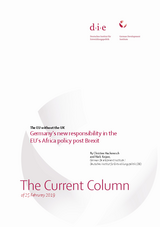The Current Column
The EU without the UK
Germany’s new responsibility in the EU’s Africa policy post Brexit
Hackenesch, Christine / Niels KeijzerThe Current Column (2019)
Bonn: German Development Institute / Deutsches Institut für Entwicklungspolitik (DIE), (The Current Column of 25 February 2019)
Bonn, 25 February 2019. All eyes are on London, and specifically the House of Commons, right now. Political dynamics in Brussels fundamentally changed right after the British referendum in 2016. This also affects European policy on Africa, where the UK once played a leading role but is now almost invisible on the European stage. The EU will need to realign its cooperation with Africa following Brexit. Germany will have multiple opportunities in the near future to proactively shape this new orientation, whether in negotiations on the new EU budget and the post-Cotonou agreement with the African, Caribbean and Pacific (ACP) countries, or after the inauguration of the next European Commission. Three fundamental questions arise for European cooperation with Africa post Brexit: to what extent will the EU’s goals, interests, strategies and instruments change? Will Europe become more or less attractive to African partners and will there be any change in what these partners expect of Europe? And how can the EU reshape its relationship with the UK on Africa policy? More competition in economic cooperation Competition in economic cooperation with Africa has increased in recent years due to the greater presence of China and other actors. The UK’s departure weakens the EU’s global position, even if its 27 remaining member countries will together continue to be Africa’s key trading partners for the foreseeable future. While small in number, the nations with which Britain has close economic relations, such as Nigeria, South Africa and Kenya, are economically significant. The extent to which the UK will step up competition with the EU in this area and, for example, attempt to offer its African partners more attractive and development friendly trade agreements, also depends on whether it will, as announced, realign its relationships with the Commonwealth countries. Peace and security: opportunities for cooperation Thanks to its significant financial and political contributions to the EU, Britain has traditionally been a driving force in Europe’s peace and security policy in Africa. Focusing on conflict prevention and peacebuilding, the UK has made particular efforts at regional level to promote conflict transformation in the Horn of Africa, while France has concentrated its activities on West Africa. Germany has also become more involved in peace and security work in recent years. The Treaty of Aachen stresses the importance of peace and security to Franco-German cooperation with Africa. Conflict prevention and peacebuilding are still likely to be areas of cooperation in which the EU and Britain have a common interest after Brexit. Who will assume the role of agenda-setter in development policy? The UK is the fourth largest European donor in Africa after the EU institutions, France and Germany. British funding is especially important in countries such as Zimbabwe, Malawi, Tanzania, Uganda, Ethiopia and Somalia. These nations, with the exception of Ethiopia, are not the focus of migration policy initiatives such as the EU Emergency Trust Fund for Africa, nor are they at the heart of efforts to promote investment. The EU needs to examine the extent to which close development cooperation with Britain is possible and beneficial within these countries even after Brexit. Aside from key financial contributions, the UK will primarily be missed as an agenda setter in European (and global) development policy. Britain has committed to championing topics such as results-oriented development cooperation, the promotion of equality and a focus on low-income countries. Additionally, the UK has traditionally advocated within the EU for the furthering of human rights and good governance in Africa. It is not clear who will take these topics forward in future within the EU and shape the content of European development policy. Germany’s new responsibility The EU and its member states must pull together more in their cooperation with African partners. Given the structural challenges in African societies and greater international competition (with China, for instance), bilateral measures by individual EU member states are losing relevance. As a result, there is already growing scope for Germany to assume more responsibility for shaping things not only at the bilateral level but also with regard to the EU’s policy towards Africa. The Federal Republic cannot and should not move forward in this area alone. Instead, it must actively seek to form (new) coalitions and alliances – not only with France, but also with other member states.



